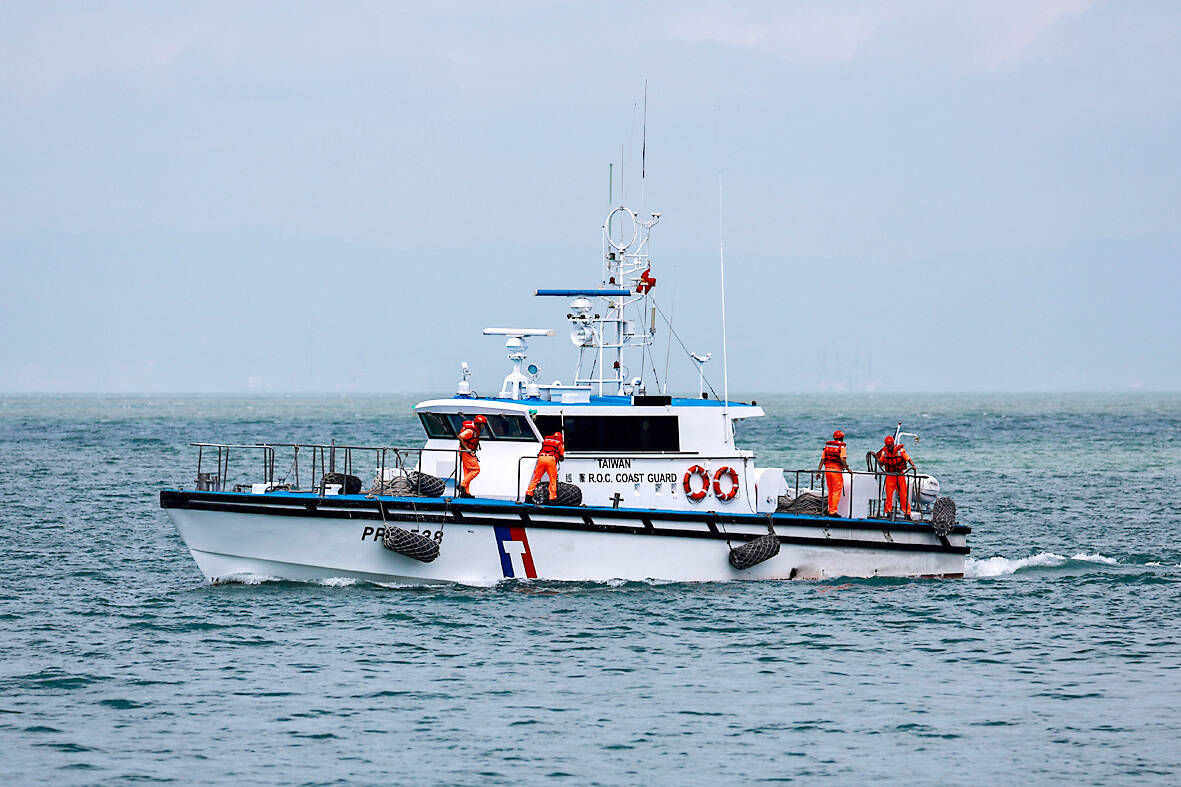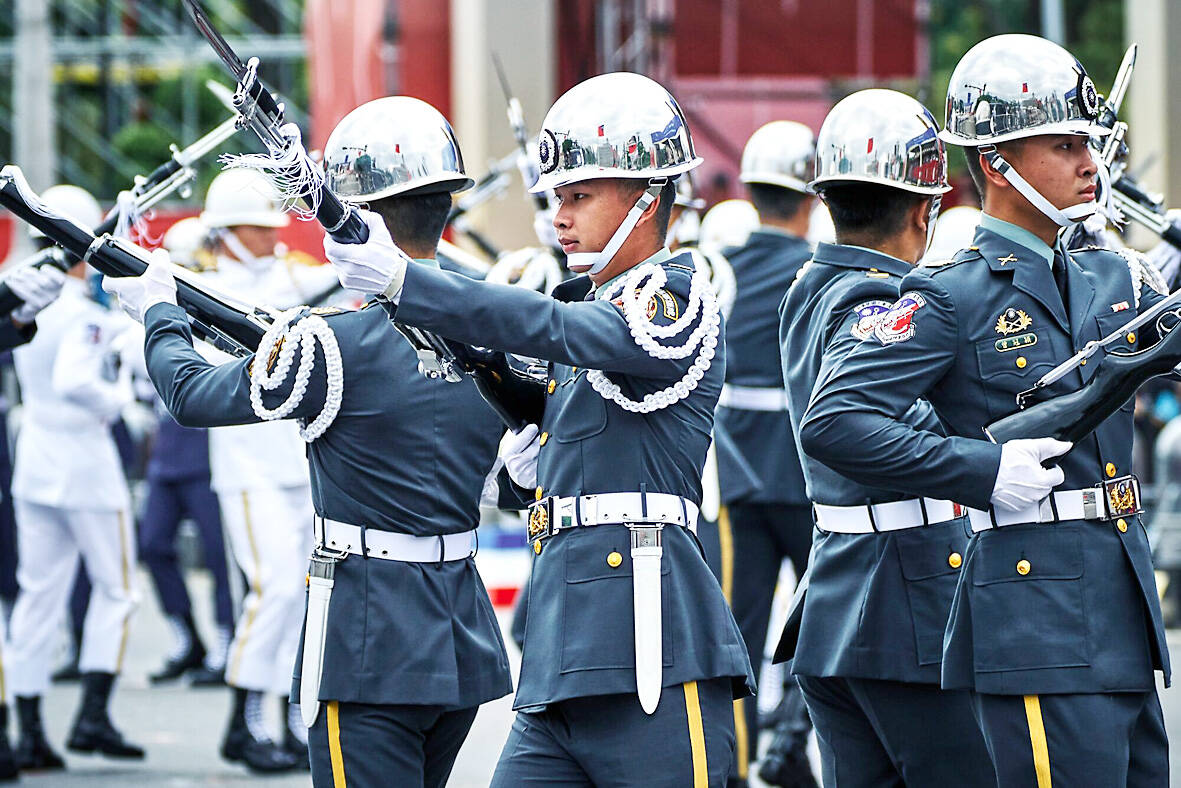Navy Commander Admiral Tang Hua (唐華) said in an interview with The Economist released on Double Ten Day that the People’s Liberation Army (PLA) is enacting an “anaconda strategy” to subdue Taiwan, and that the nation’s armed forces are being stretched thin.
“[The Chinese armed forces] are ready to blockade Taiwan at any time they want,” he said.
Tang said the navy is focused on avoiding confrontation as the PLA inches closer to the nation, because Beijing’s goal is to “force Taiwan to make mistakes,” adding that mishaps could serve as “excuses” for launching a blockade.

Photo: EPA-EFE
When will Beijing move on Taiwan? When Chinese leader Xi Jinping (習近平) calculates that doing so will do more to maintain and expand his and the CCP’s power than it will cost. This is how all decisions are made in Zhongnanhai.
On this score, the war in Ukraine has influenced Xi in at least two ways. First, he is likely encouraged that the vast “meat grinder” casualties doesn’t appear to have eroded support for President Vladimir Putin and the war. Second, it has been largely an embarrassing failure. A similar failure by Xi would not be taken well by the ultra ethno-nationalistic base that the Chinese Communist Party (CCP) has cultivated to justify its rule.
That risk, combined with Xi’s repeatedly stated concerns about the readiness of the PLA, plus his recent purges of defense officials, suggests a lack of confidence. The director of the CIA, William Burns, agrees with that assessment.

Photo: AFP
NOT YET READY FOR INVASION
There are many actions the CCP may take short of a full-scale invasion that would still change the status quo, which may or may not provoke a response from friendly nations like the US, Japan and Australia. These include a limited quarantine, invasions of Taiwan’s South China Sea islets and seizing Kinmen and Matsu.
Xi has made it clear that he intends to take over Taiwan. I do not think he is ready to take the risks of an all-out invasion of Taiwan, at least not yet.

Photo: Bloomberg
As evidenced by Monday’s Joint Sword-2024B military drills, Beijing is engaging in dress rehearsals for the next two levels of escalation: quarantine and blockade. Some use these terms interchangeably, but in the case of Taiwan the two would be different strategies, though ultimately a quarantine could morph into a blockade, which in turn could evolve into a kinetic war.
BLOCKADE
A blockade involves using the military to try and halt some or all goods and information getting in or out of Taiwan. Starting in August 2022, the PLA has held many live-fire drills in zones around Taiwan and inside the Air Defense Identification Zone (ADIZ) that were explicitly billed by Beijing as training for a blockade.
Most fret about a blockade cutting off essentials for life like food, coal, natural gas and coffee but information is vitally important as well. It is widely assumed that Chinese vessels intentionally cut the undersea communications cables to Matsu last year, another key blockade strategy.
A blockade could run from a limited action to stop certain goods from entering Taiwan to bombing and launching missiles to destroy Taiwan’s infrastructure as a prelude to either capitulation or full invasion. For more technical details on both blockade and quarantine of Taiwan by the PLA, the Center for Strategic & International Studies this summer came out with extensive reports on both.
QUARANTINE
A quarantine involves using the pretext of inspections to disrupt the inflow of goods, or simply as harassment. This could be conducted by the People’s Liberation Army Navy (PLAN), but more likely they would use the Chinese Coast Guard (CCG), Maritime Safety Administration (MSA) law enforcement and possibly maritime militia.
The reason the coast guard route is more likely is that the CCP has been laying the groundwork for it. In 2021, China passed the China Coast Guard Law, which allows the CCG to engage in law enforcement operations in “maritime areas under Chinese jurisdiction” and to conduct forcible eviction of foreign military vessels that “violate” Chinese domestic law.
The aggressive actions by the CCG in the waters of the Philippines serves to train their military in “maritime areas under Chinese jurisdiction,” in spite of their claims being ruled illegal under international law. In 2022, Beijing claimed the entirety of the Taiwan Strait as “internal waters” and last year upgraded their infamous “nine-dash line” maps to “10-dash line” to encompass Taiwan.
The CCG has already taken some explicit quarantine actions, boarding ships and even conducting arrests on Taiwanese vessels in the waters near the Kinmen Islands, arresting fishermen for violating Chinese — but not Taiwanese — law.
TESTING THE WATERS
Beijing has clearly been preparing and testing the waters for both quarantine and blockade, so either are possible and they have the capacity for both.
In comparison to its skirmishes with India in 1962 and Vietnam in 1979, a war over Taiwan would be exponentially bigger, vastly more difficult, would likely bring in foreign players like the US and would put weapons normally kept under lock-and-key in the hands of PLA soldiers.
There are many paths to mutiny, a coup or a revolt if an unprepared PLA is destroyed in the Taiwan Strait. Xi ordered the PLA to have the capacity to invade Taiwan by 2027, but his recent purges of top officers and former defense minister do not suggest that things in the PLA are going smoothly.
There are also questions about their training, weapons quality and morale. However, countering that impression is the fact that the various logistically complex live-fire training exercises held since 2022 appear to have been successful.
I think quarantine paving the way for blockade is the likely next step because in essence, they are already doing it in a limited capacity around Kinmen and in waters around the Philippines. Beijing claims these actions are “law enforcement” activities that do not involve the navy, and methods such as ramming vessels and water cannons that can cause damage and injuries (one Filipino lost a thumb), but so far no fatalities.
Ramping up quarantine would also fit the pattern of recent years of “salami slicing,” by upping the ante slowly but steadily while testing and probing to see how far they can go.
THEN JOINT SWORD-2024B HAPPENED
Concerning Monday’s Joint Sword-2024B military drills, the CCP’s mouthpiece the Global Times has referred to the PLA as conducting blockade exercises and the CCG as conducting quarantine exercises. They also made it clear that the laws they will be using as their excuse for a blockade and/or quarantine would be related to their sovereignty claims over Taiwan and the Taiwan Strait and their various “anti-secessionist” laws.
This key passage in Global Times suggests this is the direction they are moving: “Along with the blockade of key ports and areas around the island by the PLA Eastern Theater Command, the involvement of the maritime law enforcement forces will aid in inspecting and controlling atypical military targets, effectively preventing “Taiwan independence” separatists from evading sanctions under the guise of civilian purposes.”
Donovan’s Deep Dives is a regular column by Courtney Donovan Smith (石東文) who writes in-depth analysis on everything about Taiwan’s political scene and geopolitics. Donovan is also the central Taiwan correspondent at ICRT FM100 Radio News, co-publisher of Compass Magazine, co-founder Taiwan Report (report.tw) and former chair of the Taichung American Chamber of Commerce. Follow him on X: @donovan_smith.

June 2 to June 8 Taiwan’s woodcutters believe that if they see even one speck of red in their cooked rice, no matter how small, an accident is going to happen. Peng Chin-tian (彭錦田) swears that this has proven to be true at every stop during his decades-long career in the logging industry. Along with mining, timber harvesting was once considered the most dangerous profession in Taiwan. Not only were mishaps common during all stages of processing, it was difficult to transport the injured to get medical treatment. Many died during the arduous journey. Peng recounts some of his accidents in

What does the Taiwan People’s Party (TPP) in the Huang Kuo-chang (黃國昌) era stand for? What sets it apart from their allies, the Chinese Nationalist Party (KMT)? With some shifts in tone and emphasis, the KMT’s stances have not changed significantly since the late 2000s and the era of former president Ma Ying-jeou (馬英九). The Democratic Progressive Party’s (DPP) current platform formed in the mid-2010s under the guidance of Tsai Ing-wen (蔡英文), and current President William Lai (賴清德) campaigned on continuity. Though their ideological stances may be a bit stale, they have the advantage of being broadly understood by the voters.

Artifacts found at archeological sites in France and Spain along the Bay of Biscay shoreline show that humans have been crafting tools from whale bones since more than 20,000 years ago, illustrating anew the resourcefulness of prehistoric people. The tools, primarily hunting implements such as projectile points, were fashioned from the bones of at least five species of large whales, the researchers said. Bones from sperm whales were the most abundant, followed by fin whales, gray whales, right or bowhead whales — two species indistinguishable with the analytical method used in the study — and blue whales. With seafaring capabilities by humans

In a high-rise office building in Taipei’s government district, the primary agency for maintaining links to Thailand’s 108 Yunnan villages — which are home to a population of around 200,000 descendants of the Chinese Nationalist Party (KMT) armies stranded in Thailand following the Chinese Civil War — is the Overseas Community Affairs Council (OCAC). Established in China in 1926, the OCAC was born of a mandate to support Chinese education, culture and economic development in far flung Chinese diaspora communities, which, especially in southeast Asia, had underwritten the military insurgencies against the Qing Dynasty that led to the founding of